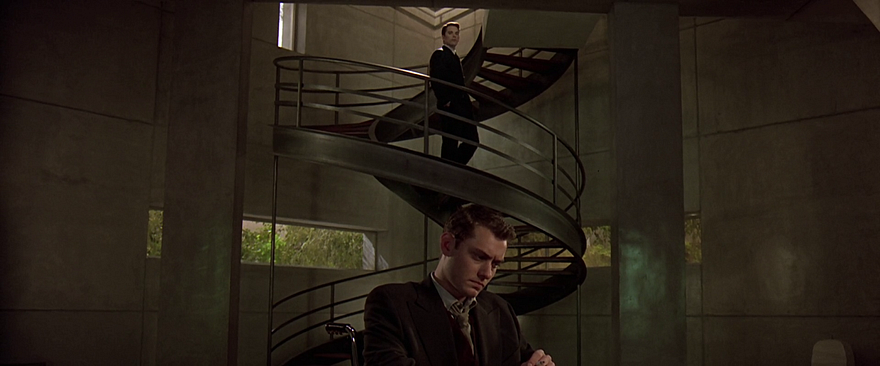Never Save Anything for the Swim Back: The Philosophy of Gattaca

In the realm of science fiction cinema, few movies have left such an indelible mark on audiences as Gattaca. Released in 1997, this dystopian sci-fi masterpiece directed by Andrew Niccol explores the profound philosophical questions surrounding human potential, genetic determinism, and the relentless pursuit of dreams. Set in a future where genetic engineering defines social status, Gattaca dares to ask what it truly means to be human. As we delve into the movie’s thought-provoking themes and captivating storyline, let us embark on a journey to unravel the philosophy of Gattaca.
A Glimpse into the Genetic-Dystopia
In Gattaca, the world is divided into two distinct classes: the genetically superior “valids” and the natural-born “in-valids.” Vincent Freeman, portrayed by Ethan Hawke, is one of the latter, a man born naturally without the genetic enhancements that society values so highly. Despite his genetic inferiority, Vincent aspires to work for the Gattaca Aerospace Corporation and travel to the stars.
As we are introduced to this genetic dystopia, the movie challenges us to reflect on the implications of such a society. Does genetic engineering devalue the worth of individuals who are not genetically enhanced? Are we more than just our genetic makeup? These fundamental questions prod at the essence of what it means to be human and, in turn, encourage us to embrace our individuality and potential beyond our genetic limitations.
The Triumph of the Human Spirit

“I was never more certain of how far away I was from my goal than when I was standing right beside it.
Amidst the oppressive system, Vincent refuses to accept the predetermined fate dictated by his genetics. Through sheer determination and an unwavering belief in his abilities, he takes on the identity of Jerome Morrow (played by Jude Law), a genetically superior man who becomes paralyzed in an accident. This triumph is immortalized in the scene where Vincent and his genetically-perfect brother Anton play “Chicken” by seeing who will turn back from swimming out into the ocean. When Vincent eventually wins, Anton asks “how?” Vincent replies, “You wanna know how I did it? This is how I did it, Anton. I never saved anything for the swim back.”
This act of “genetic impersonation” raises profound ethical questions about identity and authenticity. Can we truly escape our genetic blueprint, or are we destined to live within its confines? Vincent’s journey suggests that the human spirit can transcend the limits of biology, and the will to achieve our dreams can overcome even the most significant obstacles.
Nature vs. Nurture: The Battle for Determinism

“There’s no gene for fate.”
At the heart of Gattaca lies the timeless debate of nature versus nurture. The society in the movie, ruled by genetic determinism, firmly believes that an individual’s potential is solely determined by their genetic makeup. However, Vincent’s story challenges this deterministic view.
As Vincent excels in his job at Gattaca and approaches his dream of space travel, he underscores the importance of nurture, perseverance, and hard work. He disproves the notion that genetics hold an absolute grasp over our destinies, emphasizing that the choices we make and the efforts we put forth can shape our lives profoundly.
The Cost of Perfection
While the pursuit of genetic perfection promises a utopian society in Gattaca, the movie also delves into the dark side of such an ambition. The pressure to be perfect and the fear of imperfection can lead to a cold and unforgiving world. The character’s constant struggle to hide their flaws and maintain their facades highlights the soul-crushing weight of societal expectations.
Through the lens of this cautionary tale, the movie reminds us of the significance of embracing our imperfections. It is our flaws that make us human, and the acceptance of our limitations can lead to personal growth and a more compassionate society.
Ethical Dilemmas and Moral Compass

The society depicted in Gattaca raises important ethical dilemmas surrounding genetic engineering and the potential consequences of playing with the very fabric of life. It forces us to question the morality of genetic selection, the commodification of life, and the slippery slope toward eugenics.
As we watch the characters grapple with the consequences of their choices, we are compelled to ponder our own moral compass. What lines are we willing to cross in the name of progress? How do we strike a balance between scientific advancement and ethical responsibility?
Embracing the Beauty of Imperfection
“For someone who was never meant for this world, I must confess I’m suddenly having a hard time leaving it. Of course, they say every atom in our bodies was once part of a star. Maybe I’m not leaving… maybe I’m going home.”
In conclusion, Gattaca is a film that transcends its sci-fi genre, inviting us to explore the depths of human potential, the value of individuality, and the dangers of an obsession with perfection. It serves as a poignant reminder that our worth as humans extends far beyond our genetic makeup.
By embracing our flaws and celebrating our uniqueness, we can break free from the constraints of determinism and chart our own paths. Just like Vincent, who defied his genetic destiny to reach the stars, we too can rise above adversity and forge our destinies. Vincent is the physical manifestation of the Latin phrase “per aspera ad astra,” which translates to “through difficulty to the stars.” Gattaca challenges us to be architects of our fate, shaping a future that cherishes the beauty of imperfection and the boundless potential of the human spirit.